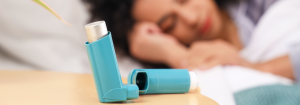When you have type 2 diabetes, being unwell – even with a cold or stomach bug – can affect your blood sugar levels and your body’s ability to stay balanced.
This guide explains why sick day rules are important, what you should do when you’re unwell, and when to get help.
Why does being ill affect diabetes?
When you’re sick, your body releases stress hormones to fight infection. These hormones can make your blood sugar rise, even if you’re not eating much. At the same time, some illnesses (like diarrhoea or vomiting) can lower your blood sugar or lead to dehydration.
If not managed properly, illness can lead to serious problems like:
- High blood sugar (hyperglycaemia)
- Low blood sugar (hypoglycaemia)
- Diabetic ketoacidosis (DKA) – rare in type 2 diabetes, but still possible
- Dehydration
That’s why it’s important to follow “sick day rules” when you’re unwell.
What are sick day rules?
Sick day rules are simple steps you should follow when you’re ill to keep your diabetes under control and avoid complications.
- Keep taking your diabetes medication (usually)
- Don’t stop your medication unless advised by a doctor.
- Even if you’re not eating much, your blood sugar may still rise due to illness.
- However, some medications should be paused if you’re dehydrated (see below).
Common medications you may need to pause:
- Metformin – stop if you are vomiting or have diarrhoea to reduce risk of lactic acidosis.
- SGLT2 inhibitors (e.g. dapagliflozin, empagliflozin) – stop during illness to reduce risk of DKA.
- Your GP, pharmacist, or diabetes team can advise exactly what to do.
- Monitor your blood sugar more often
- Aim to check every 4-6 hours if possible.
- Keep a written record of your readings.
- If your levels are too high or too low, get medical advice.
- Drink plenty of fluids
- Aim for small sips every 15-30 minutes if you can’t manage large drinks.
- Try water, sugar-free squash, or clear soups.
- Avoid becoming dehydrated – it can raise blood sugar and damage kidneys.
- Try to eat little and often
- If you can’t eat normal meals, try simple foods like toast, rice, or soup.
- If you’re struggling to eat, still drink fluids with calories (like milk or fruit juice) to avoid low blood sugar.
- Know when to get help
Call your GP, 111, or diabetes team if:
- Your blood sugar stays high or low
- You can’t eat or drink for more than 24 hours
- You’re being sick often or have bad diarrhoea
- You feel drowsy, confused, or very unwell
Special notes about certain medicines
Some diabetes and blood pressure medications need extra care during illness. These include:
- Metformin – pause if vomiting or risk of dehydration (to avoid lactic acidosis).
- SGLT2 inhibitors – stop temporarily during illness to prevent rare but serious DKA.
- ACE inhibitors (e.g. ramipril, lisinopril) or ARBs (e.g. losartan) – pause if you’re dehydrated to avoid kidney strain.
- Diuretics (e.g. furosemide, bendroflumethiazide) – stop if vomiting or low blood pressure.
Always seek advice from a healthcare professional before stopping any medication.
Prepare a sick day kit
It’s helpful to have a sick day kit ready. This might include:
- Blood sugar monitor and test strips
- Thermometer
- Oral rehydration sachets (e.g. Dioralyte)
- Simple pain relief (e.g. paracetamol)
- Glucose tablets or sugary drinks (in case of low blood sugar)
- Contact numbers for your GP, pharmacist, and diabetes nurse
Support from the NHS
- You can get advice from your GP, diabetes team, NHS 111, or pharmacist.
- Diabetes UK also offers a helpline and online guidance.
- Sick day rules are part of your diabetes care plan – ask your nurse or GP for a printed version.
Key takeaways
- Being unwell can affect your blood sugar and cause serious problems if not managed properly.
- Follow sick day rules to stay safe: keep taking medication (unless advised), monitor blood sugar, drink fluids, and get help if needed.
- Speak to your GP or diabetes team if you’re unsure what to do when you’re sick.
You are the most important person in your diabetes care. Knowing what to do on sick days helps keep you safe and in control, even when you’re not feeling your best.
Take control of your health during illness
If you haven’t already, download the Evergreen Life app today to easily track your blood sugar, medications, and diabetes management.
You can also find wellbeing insights through questionnaires and articles and access your health data whenever you need it – making it easier to manage your diabetes, even on sick days.
- Diabetes UK (2023) Diabetes when you’re unwell. Diabetes UK.
Offers a detailed guide on sick day rules, including medication advice, hydration, and monitoring. - NICE (2015; last updated 2022) Type 2 diabetes in adults: Management (NG28). NICE.
Covers how to adjust treatment during intercurrent illness and guidance on when to pause medications. - Trend UK (2020). Type 2 diabetes: What to do when you are ill (Information Leaflet). Trend UK.
Professional education tool with a printable leaflet detailing which medications to stop during illness.





